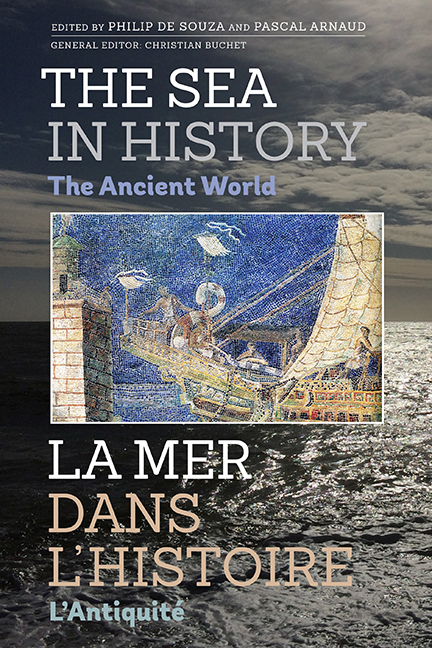Book contents
- Frontmatter
- Contents
- List of Illustrations
- List of Contributors
- Introduction générale et remerciements par Christian Buchet
- General introduction and acknowledgements
- Introduction (français)
- Introduction (English)
- La mer est le propre d'Homo sapiens
- PREHISTORICAL CASE STUDIES
- Maritime aspects of early Andean civilizations
- Une approche maritime et archipélique de l'occupation amérindienne des Antilles
- The Taíno of the Caribbean: six thousand years of seafaring and cultural development
- The importance of the sea for prehistoric societies in Western Europe
- Pêche et interactions entre la Moyenne Vallée du fleuve Sénégal et le littoral atlantique Sénégalo-Mauritanien durant le dernier millénaire BC
- The sea and early societies in the Japanese Islands
- Développement maritime de la civilisation océanienne
- HISTORIAL CASE STUDIES: The Ancient Near East and Pharaonic Egypt
- HISTORICAL CASE STUDIES: The Mediterranean world
- HISTORICAL CASE STUDIES: The Indian Ocean and the Far East
- Conclusion (français)
- Conclusion (English)
- Conclusion générale par Christian Buchet
- General conclusion
- Comprendre le rôle de la mer dans L'histoire pour éclairer notre avenir
- Understanding the role the sea has played in our past in order to shed light on our future!
The sea and early societies in the Japanese Islands
from PREHISTORICAL CASE STUDIES
Published online by Cambridge University Press: 20 April 2017
- Frontmatter
- Contents
- List of Illustrations
- List of Contributors
- Introduction générale et remerciements par Christian Buchet
- General introduction and acknowledgements
- Introduction (français)
- Introduction (English)
- La mer est le propre d'Homo sapiens
- PREHISTORICAL CASE STUDIES
- Maritime aspects of early Andean civilizations
- Une approche maritime et archipélique de l'occupation amérindienne des Antilles
- The Taíno of the Caribbean: six thousand years of seafaring and cultural development
- The importance of the sea for prehistoric societies in Western Europe
- Pêche et interactions entre la Moyenne Vallée du fleuve Sénégal et le littoral atlantique Sénégalo-Mauritanien durant le dernier millénaire BC
- The sea and early societies in the Japanese Islands
- Développement maritime de la civilisation océanienne
- HISTORIAL CASE STUDIES: The Ancient Near East and Pharaonic Egypt
- HISTORICAL CASE STUDIES: The Mediterranean world
- HISTORICAL CASE STUDIES: The Indian Ocean and the Far East
- Conclusion (français)
- Conclusion (English)
- Conclusion générale par Christian Buchet
- General conclusion
- Comprendre le rôle de la mer dans L'histoire pour éclairer notre avenir
- Understanding the role the sea has played in our past in order to shed light on our future!
Summary
ABSTRACT.This contribution examines the role of the sea in the human history of the Japanese Islands from earliest times until the rise of the state in the middle of the first millennium AD. It also includes a brief discussion of the importance of the sea for the indigenous Ainu people of the northern islands of Hokkaido, Sakhalin and the Kurils, a people who remained without written records until Japanese and Russian colonization in the 19th century.
RÉSUMÉ.Cette contribution analyse le rôle de la mer dans L'histoire humaine des îles japonaises, des premiers temps à l'ascension de l'État au milieu du Ier siècle ap. J.-C. Elle s'intéresse également brièvement à l'importance de la mer chez le peuple indigène Aïnous dans les îles septentrionales d'Hokkaido, de Sakhaline et des Kouriles, un peuple dont il n'existe aucun témoignage écrit avant les colonisations japonaise et russe du XIXème siècle.
ORIENTATION
Geography gives the sea an unquestioned importance in Japanese history. Japan is, to paraphrase Braudel, a sea-locked land. The Japanese archipelago stretches over about 3000 km, a distance equivalent to that between Paris and northern Syria. The islands themselves are mostly mountainous and covered in thick forests. These physical conditions mean that, until the coming of the railroad in the late 19th century, communication by sea was almost always easier than by other methods. There is clear evidence of the use of watercraft in Japan from the Late Pleistocene and maritime contact and exchange became increasingly significant in later periods of Japanese history.
Despite the natural importance of the sea to ancient Japan, however, Japanese historical research has tended to emphasize the land and land-based power. In particular, rice and rice farming have played a central role in Japanese views of their history and identity. The main critique of this rice-based historiography came from medieval historian Yoshihiko Amino (1928–2004) who explored the worlds of fishers, traders, entertainers and others whose lives were not centred around rice growing.
- Type
- Chapter
- Information
- The Sea in History - The Ancient World , pp. 102 - 113Publisher: Boydell & BrewerPrint publication year: 2017
- 1
- Cited by



